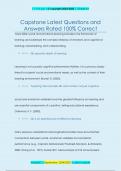1 | P a g e | © copyright 2024/2025 | Grade A+
Capstone Latest Questions and
Answers Rated 100% Correct
Kress 2004: social and emotional learning broadens the framework of
learning and addresses the complex interplay of emotions and cognition in
learning, remembering, and understanding.
✓ <~~> SEL expands depth of learning
Learning is not a purely cognitive phenomenon Rather, it is a process closely
linked to students' social and emotional needs, as well as the context of their
learning environment. Brandt, R. (2003).
✓ <~~> "Learning" also includes SEL and context, not just cognitive
social and emotional variables have the greatest influence on learning and
are essential components of a positive, lasting educational experience.
Osterman, K. F. (2000).
✓ <~~> SEL is an essential part of effective learning
Many previous correlational and longitudinal studies have documented
connections between social- emotional variables and academic
performance (e.g., Caprara, Barbaranelli, Pastorelli, Bandura, & Zimbardo,
2000; Wang et al., 1997). Durlak 2011 Meta-analysis of 213 school-based,
Master01 | September, 2024/2025 | Latest update
, 1 | P a g e | © copyright 2024/2025 | Grade A+
universal social and emotional learning (SEL) programs involving 270,034
kindergarten through high school students revealed significant positive
effects on targeted social-emotional competencies and attitudes and
enhanced students' behavior and improved academic performance on
achievement tests and grades. (Although based on a small subset of all
reviewed studies, the 11-percentile gain in academic performance achieved
in these programs is noteworthy,) Results from this review add to a growing
body of research indicating that SEL programming enhances students'
connection to school, classroom behavior, and academic achievement (Zins
et al., 2004
✓ <~~> Research supports connection between SEL and academic
performance
Carol Dweck and her colleagues began investigating why certain students
viewed challenges positively and were able to "bounce back" from failures,
while others were less resilient in the face of challenge and adversity. Out of
years of research came her groundbreaking finding: the type of mindset
individuals adopt can have profound implications for how they conceive
their learning and personal characteristics (Dweck, 2006; Dweck et al., 1995;
Dweck & Leggett, 1988; Molden & Dweck, 2006).
✓ <~~> Origin of mindset theory
Master01 | September, 2024/2025 | Latest update
, 1 | P a g e | © copyright 2024/2025 | Grade A+
Research suggests that students' mindsets may be partially due to their
academic achievement goals. Researchers have identified two different
categories of achievement goals: mastery and performance. With mastery
goals, the key concern is long-term skill development; learning process itself is
appreciated and it is understood that mastery is dependent on effort (Ames
& Archer, 1988). Conversely, performance goals are tied to external
outcomes (e.g. grades, teacher praise) and the primary concern is
demonstrating ability, usually by outperforming others or by achieving
success with little effort (Ames & Archer, 1988).
✓ <~~> Two categories of achievement goals and role in mindset
mastery and performance
Dweck (2006) suggests that a growth mindset evolves from an attitude of
hard work, learning, training, and perseverance. A growth mindset is viewed
as changeable and can be developed through work ethic and
perseverance.
✓ <~~> Growth mindset creation through effort and persevernace
Students with a growth mindset view failures as potential chances for
instructive feedback and are more likely to learn from mistakes (Dweck,
2006)Those with a growth mindset (or incremental theory of intelligence)
believe that intelligence is malleable (Dweck & Leggett, 1988; Murphy &
Dweck, 2010) and can be improved (Dweck, 2008; Dweck & Leggett, 1988;
Master01 | September, 2024/2025 | Latest update
, 1 | P a g e | © copyright 2024/2025 | Grade A+
Yeager & Dweck 2012). Individuals with a growth mindset prioritize learning,
persistence, and hard work (Dweck, 2008). Growth mindset does not posit
that everyone has equal intelligence and recognizes that people possess
inherent qualities to different extents but that everyone has the potential to
strengthen and build upon their intelligence (Blackwell et al., 2007).
✓ <~~> Growth mindset attributes
Two traits that predict achievement within a growth mindset are grit and self-
control. The mindset held in any domain has a great influence on how gritty
an individual will be in the pursuit of accomplishments.
✓ <~~> GM and grit lead to achievement
Yeager 2020. Mind- set theory (Dweck, 1999; Dweck & Leggett, 1988; see
Dweck & Yeager, 2019) grows out of two traditions of motivational research:
attribution theory and achievement goal theory.
✓ <~~> Mindset theory from attribution theory and achievement goal
theory
Attribution theory proposed that people's explanations for a success or a
failure (their attributions) can shape their reactions to that event, with
attributions of failure to lack of ability leading to less persistent responses to
Master01 | September, 2024/2025 | Latest update




